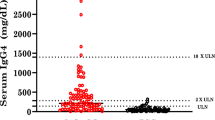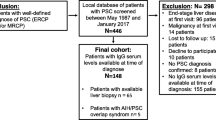Summary
Immune-related sclerosing cholangitis (irSC) is relatively rare and its clinical characteristics are not well known. In this study, we aimed to summarize the clinical features of irSC. Clinical data were collected retrospectively from 1,393 patients with advanced malignancy treated with immune-checkpoint inhibitors (ICIs) between August 2014 and October 2021. We analyzed patients with immune-related adverse events of liver injury (liver-irAEs) and compared irSC and non-irSC groups. Sixty-seven patients (4.8%) had a liver-irAE (≥ grade 3) during the follow-up period (median, 262 days). Among these, irSC was observed in eight patients (11.9%). All patients in the irSC group were treated with anti-PD-1/PD-L1 antibodies. Compared with the non-irSC group, the irSC group showed mainly non-hepatocellular liver injury (87.5 % vs 50.8 %, P = 0.065), and had elevated serum inflammatory markers (e.g., CRP and NLR) and biliary enzymes (e.g., GGTP and ALP) at the onset of liver-irAEs. Furthermore, most patients with irSC had abdominal pain. In the non-irSC group, the liver injury of 23 patients improved only with the discontinuation of ICIs, and 22 patients improved with medication including prednisolone (PSL). Conversely, almost all patients (n=7) in the irSC group were treated with PSL, but only two patients experienced an improvement in liver injury. We found that irSC is characterized by a non-hepatocellular type of liver injury with abdominal pain and a high inflammatory response and is refractory to treatment. Further examination by imaging is recommended to detect intractable irSC in cases with these characteristics.


Similar content being viewed by others
Data availability
The datasets generated during and/or analyzed during the current study are available from the corresponding author on reasonable request.
References
Peeraphatdit T, Wang J, Odenwald MA et al (2020) Hepatotoxicity From Immune Checkpoint Inhibitors: A Systematic Review and Management Recommendation. Hepatology 72(1):315–29
Postow MA, Sidlow R, Hellmann MD (2018) Immune-related adverse events associated with immune checkpoint blockade. N Engl J Med 378(2):158–168
Raschi E, Gatti M, Gelsomino F et al (2020) Lessons to be Learnt from Real-World Studies on Immune-Related Adverse Events with Checkpoint Inhibitors: A Clinical Perspective from Pharmacovigilance. Target Oncol. 15(4):449–66
Fukihara J, Sakamoto K, Koyama J et al (2019) Prognostic Impact and Risk Factors of Immune-Related Pneumonitis in Patients With Non–Small-Cell Lung Cancer Who Received Programmed Death 1 Inhibitors. Clin Lung Cancer. 20(6):442-450.e4
Yamamoto T, Ito T, Hase T et al (2021) Immune-related Liver Injury is a Poor Prognostic Factor in Patients with Nonsmall Cell Lung Cancer Treated with Immune Checkpoint Inhibitors. Cancer Invest. 40(2):189–98
Mizuno K, Ito T, Ishigami M et al (2020) Real world data of liver injury induced by immune checkpoint inhibitors in Japanese patients with advanced malignancies. J Gastroenterol 55(6):653–661
Ito T, Ishigami M, Yamamoto T et al (2021) Clinical course of liver injury induced by immune checkpoint inhibitors in patients with advanced malignancies. Hepatol Int 15(5):1278–1287
De Martin E, Michot JM, Papouin B et al (2018) Characterization of liver injury induced by cancer immunotherapy using immune checkpoint inhibitors. J Hepatol 68(6):1181–1190
Kawakami H, Tanizaki J, Tanaka K et al (2017) Imaging and clinicopathological features of nivolumab-related cholangitis in patients with non-small cell lung cancer. Invest New Drugs 35(4):529–536
Gelsomino F, Vitale G, Ardizzoni A (2018) A case of nivolumab-related cholangitis and literature review: how to look for the right tools for a correct diagnosis of this rare immune-related adverse event. Invest New Drugs 36(1):144–146
Onoyama T, Takeda Y, Yamashita T et al (2020) Programmed cell death-1 inhibitor-related sclerosing cholangitis: A systematic review. World J Gastroenterol 26(8):353–365
Kashima J, Okuma Y, Shimizuguchi R et al (2018) Bile duct obstruction in a patient treated with nivolumab as second-line chemotherapy for advanced non-small-cell lung cancer: a case report. Cancer Immunol Immunother 67(1):61–65
Cheung V, Gupta T, Payne M et al (2019) Immunotherapy-related hepatitis: real-world experience from a tertiary centre. Frontline Gastroenterol 10(4):364–371
Andrade RJ, Aithal GP, Björnsson ES et al (2019) EASL Clinical Practice Guidelines: Drug-induced liver injury. J Hepatol 70(6):1222–1261
Aithal GP, Watkins PB, Andrade RJ et al (2011) Case definition and phenotype standardization in drug-induced liver injury. Clin Pharmacol Ther 89(6):806–815
De Martin E, Michot JM, Rosmorduc O et al (2020) Liver toxicity as a limiting factor to the increasing use of immune checkpoint inhibitors. JHEP Reports Innov Hepatol 2(6)
Kanda Y (2013) Investigation of the freely available easy-to-use software “EZR” for medical statistics. Bone Marrow Transplant 48(3):452–58
Berry P, Kotha S, Zen Y et al (2022) Immune checkpoint inhibitor-related cholangiopathy: Novel clinicopathological description of a multi-centre cohort. Liver Int. https://doi.org/10.1111/liv.15340. Online ahead of print
Takinami M, Ono A, Kawabata T et al (2021) Comparison of clinical features between immune-related sclerosing cholangitis and hepatitis. Invest New Drugs 39(6):1716–1723
Koya Y, Shibata M, Shinohara N et al (2019) Secondary sclerosing cholangitis with hemobilia induced by pembrolizumab: Case report and review of published work. Hepatol Res 49(8):950–956
Hori H, Fujita K, Nishio A et al (2022) Pembrolizumab-related cholangitis with multiple fatal liver abscesses after endoscopic biliary drainage: a case report and review of the literature. Clin J Gastroenterol 15(2):475–479
Husain B, Kirchberger MC, Erdmann M et al (2021) Inflammatory markers in autoimmunity induced by checkpoint inhibitors. J Cancer Res Clin Oncol 147(6):1623–1630
Abolhassani AR, Schuler G, Kirchberger MC et al (2019) C-reactive protein as an early marker of immune-related adverse events. J Cancer Res Clin Oncol 145(10):2625–2631
Yu Y, Wang S, Su N et al (2022) Increased Circulating Levels of CRP and IL-6 and Decreased Frequencies of T and B Lymphocyte Subsets Are Associated With Immune-Related Adverse Events During Combination Therapy With PD-1 Inhibitors for Liver Cancer. Front Oncol. 12
Heinrich PC, Castell J V., Andus T (1990) Interleukin-6 and the acute phase response. Biochem J 265(3):621–636
Dimitriou F, Hogan S, Menzies AM et al (2021) Interleukin-6 blockade for prophylaxis and management of immune-related adverse events in cancer immunotherapy. Eur J Cancer 157:214–224
Moi L, Bouchaab H, Mederos N et al (2021) Personalized Cytokine-Directed Therapy With Tocilizumab for Refractory Immune Checkpoint Inhibitor-Related Cholangiohepatitis. J Thorac Oncol 16(2):318–326
Nakano R, Shiomi H, Fujiwara A et al (2022) Clinical Characteristics of ICI-Related Pancreatitis and Cholangitis Including Radiographic and Endoscopic Findings. Healthc (Basel, Switzerland). 10(5):763
Pi B, Wang J, Tong Y et al (2021) Immune-related cholangitis induced by immune checkpoint inhibitors: a systematic review of clinical features and management. Eur J Gastroenterol Hepatol 33(1S Suppl 1):e858–e867
Yamamoto T, Ito T, Mizuno K et al (2022) A case of antiprogrammed death-ligand 1 antibody-induced multisystem immune-related adverse events with pancreatitis and steroid-resistant sclerosing cholangitis. J Dig Dis 23(7):404–409
Acknowledgments
We wish to thank all those who contributed to the collection of data for this study. We also thank H. Nikki March, PhD, from Edanz (https://jp.edanz.com/ac) for editing a draft of this manuscript.
Funding
This research did not receive any specific grants from funding agencies in the public, commercial, or not-for-profit sectors.
Author information
Authors and Affiliations
Contributions
Concept and study design: Takafumi Yamamoto, Kazuyuki Mizuno, Takanori Ito, Takuya Ishikawa, and Masatoshi Ishigami. Data acquisition: Takafumi Yamamoto, Kazuyuki Mizuno, and Takanori Ito. Drafting of the manuscript: Takafumi Yamamoto, Kazuyuki Mizuno, Takanori Ito, and Masatoshi Ishigami. Critical revision of the manuscript for important intellectual content: Shinya Yokoyama, Kenta Yamamoto, Norihiro Imai, Yoji Ishizu, Takashi Honda, Takuya Ishikawa, Kanamori Akira, Satoshi Yasuda, Hidenori Toyoda, Kenji Yokota, Tetsunari Hase, Naoki Nishio, Osamu Maeda, Makoto Ishii, Michihiko Sone, Yuichi Ando, Masashi Akiyama, and Hiroki Kawashima. Statistical analysis: Takafumi Yamamoto, Kazuyuki Mizuno, and Takanori Ito. All the authors approved the final version of the manuscript.
Corresponding author
Ethics declarations
Approval of the research protocol
This study was conducted by the tenets of the Declaration of Helsinki and approved by the Institutional Review Board of Nagoya University Hospital (no. 2018-0438).
Informed Consent
Informed consent for this study was obtained from the website of Nagoya University Hospital.
Registry and the registration no. of the study/trial
N/A.
Animal studies
N/A.
Research involving recombinant DNA
N/A.
Conflict of interest disclosure
Takanori Ito received personal fees from Chugai Pharmaceutical Co., Ltd. outside the submitted work. Masatoshi Ishigami received grants from Chugai Pharmaceutical Co., Ltd. outside the submitted work. Tetsunari Hase received grants and personal fees from AstraZeneca, grants and personal fees from Chugai Pharmaceutical Co., Ltd., personal fees from Ono Pharmaceutical Co., Ltd., personal fees from Bristol-Myers Squibb Co., and personal fees from MSD K.K, outside the submitted work. Yuichi Ando received grants and personal fees from Chugai Pharmaceutical Co.,Ltd., grants and personal fees from Kyowa Kirin Co.,Ltd., grants and personal fees from Nippon Kayaku Co., Ltd., grants and personal fees from Yakult Honsha Co.,Ltd., personal fees from Eli Lilly Japan K.K., grants and personal fees from Ono Pharmaceutical Co.,Ltd., grants and personal fees from Taiho Pharmaceutical Co.,Ltd., grants and personal fees from Novartis Pharma K.K., personal fees from Bayer Holding Ltd., personal fees from Sawai Pharmaceutical Co., Ltd, grants and personal fees from Daiichi Sankyo Company, Ltd., grants and personal fees from Eisai Co.,Ltd., personal fees from MSD K.K, personal fees from Astellas Pharma Inc., personal fees from Otsuka Holdings Co.,Ltd., personal fees from Sanwa Kagaku Kenkyusho Co., Ltd., personal fees from Hisamitsu Pharmaceutical Co., Inc., personal fees from SymBio Pharceuticals, personal fees from Aptitude Health, grants from BeiGene, Ltd, personal fees from Alfresa Pharma Corporation, outside the submitted work; . Masashi Akiyama received research grants from Ono Pharmaceutical Co., Ltd. and Taiho Pharmaceutical Co., Ltd. outside the submitted work.
Additional information
Publisher's Note
Springer Nature remains neutral with regard to jurisdictional claims in published maps and institutional affiliations.
Supplementary Information
Below is the link to the electronic supplementary material.
Rights and permissions
Springer Nature or its licensor (e.g. a society or other partner) holds exclusive rights to this article under a publishing agreement with the author(s) or other rightsholder(s); author self-archiving of the accepted manuscript version of this article is solely governed by the terms of such publishing agreement and applicable law.
About this article
Cite this article
Yamamoto, T., Mizuno, K., Ito, T. et al. Abdominal pain accompanied by elevated serum inflammatory markers and biliary enzymes for diagnosing immune checkpoint inhibitor-induced sclerosing cholangitis. Invest New Drugs 41, 512–521 (2023). https://doi.org/10.1007/s10637-023-01366-3
Received:
Accepted:
Published:
Issue Date:
DOI: https://doi.org/10.1007/s10637-023-01366-3




